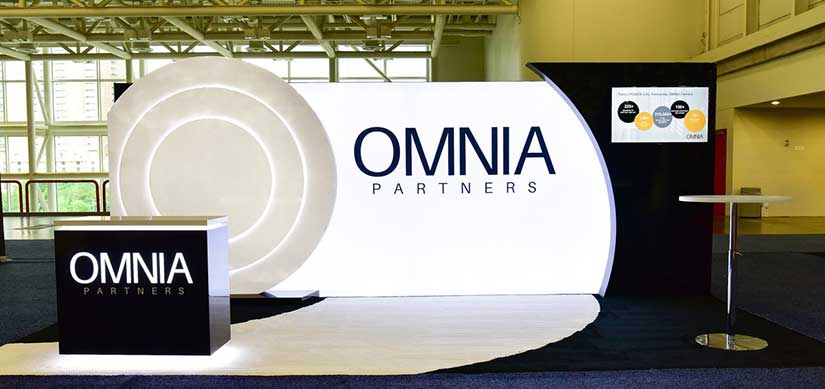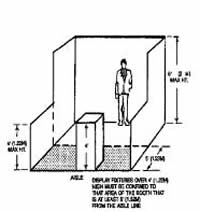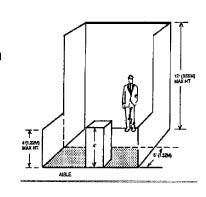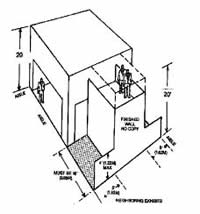Exhibit Design Search / Trade Show and Event Tips / USA Trade Show Regulations and Photos /
Standard USA Booth Regulations and Types
Standard Booth Regulations (USA)

There are four types of booth configurations: Standard/Linear, Perimeter Wall, Peninsula, and Island. The following booth display rules are typical for U.S. Trade Shows and Convention Halls. However, regulations vary by convention center and even within show halls. Contact show management for specific regulations.

Standard/Linear Booth (10' depth)
Any booth that shares a common back wall and abuts other exhibits on one or two sides.
Maximum height is 8'. This 8' height may be maintained on the sidewall of your booth up to a distance of 5' from the front aisle. The remaining length of the sidewall may be no higher than 4'.
A corner booth is a linear booth exposed to aisle on two sides. All other guidelines for linear booths apply.
Note: Hanging signs are not permitted over standard/linear booths.

Perimeter Wall Booth (10' depth)
A standard/linear booth found on the perimeter walls of the exhibit floor.
The maximum height is 12'. This 12' height may be maintained on the sidewalls of your booth up to a distance of S' from the front aisle. The remaining length of the sidewall may be no
higher than 4'.
Note: Hanging signs are not permitted over perimeter wall booths.
Peninsula Booth
 Any exhibit 20' x 20' or larger with a depth from the common back wall to the aisle of at least 20' and with aisles on three sides. There are two types of Peninsula Booths: (a) one that backs up to Linear Booths, and (b) one that backs p to another Peninsula Booth and is referred to as a "Split Island Booth."
Any exhibit 20' x 20' or larger with a depth from the common back wall to the aisle of at least 20' and with aisles on three sides. There are two types of Peninsula Booths: (a) one that backs up to Linear Booths, and (b) one that backs p to another Peninsula Booth and is referred to as a "Split Island Booth."
For all peninsula booths, the exterior of the back wall must be plainly finished and may not contain booth identification, logos or advertisements.
If backed by a row of standard/linear booths, the back wall may be no higher than 4' for a distance of 5' from either side aisle and 20' high in the center of the back wall. These height restrictions must be maintained for a distance of 10' from the back wall.
Where two (2) peninsula booths share a common back wall ("split Island"), the maximum height may be 20' in all areas of the booth, including the back wall (same as Island Booth rules, below).
Note: Hanging signs are permitted over peninsula booths that are 20' x 20' or larger.

Island Booth
Any exhibit 20' x 20' or larger and is surrounded by aisles on four sides.
Regulations vary by exhibit hall but the following are typical examples: Maximum height of 30' in all areas of your booth allowed in North Hall and Central Halls 3-5. Maximum height of 20' in all areas of your booth is allowed in Central Halls 1-2. Maximum height of 22' in all areas of your booth allowed in South Halls. No limitations on the number of solid walls for your Island booth. Be sure to check the hall regulations.
Note: Hanging signs are permitted above island booths.
OTHER CONSIDERATIONS
Canopies and Ceilings
Canopies, including ceilings, umbrellas and canopy frames, can be either decorative or functional (such as to shade computer monitors from ambient light or for hanging products). Canopies for Linear or Perimeter Booths should comply with line-of-sight requirements.
The bottom of the canopy should not be lower than 7 ft. (2.13m) from the floor within 5 ft. (l.52m) of any aisle. Canopy supports should be no wider than three inches 3 in.(08m). This applies to any booth configuration that has a sight line restriction, such as a Linear Booth. Fire and safety regulations in many facilities strictly govern the use of canopies, ceilings, and other similar coverings. Check with the appropriate local agencies prior to determining specific exhibition rules.
Covered ceiling structures or enclosed rooms, including tents or canopies, shall have one smoke detector placed on the ceiling for every 900 square feet.
Hanging Signs and Graphics
Hanging signs and graphics are permitted upon approval in all standard Peninsula, Island and Split Island Booths, with a maximum height of sixteen feet (16 ft.)(4.87m) to the top of the sign as measured from the floor
Whether suspended from above or supported from below, they should comply with all ordinary use-of-space requirements (for example, the highest point of any sign may not exceed the maximum allowable height for the booth type). Double-sided hanging signs and graphics shall be set back ten feet (10 ft.)(3.05m) from adjacent booths and be directly over contracted space only.
Theatrical Truss and Lighting
Ceiling-supported theatrical truss and lighting are permitted in all standard Peninsula, Island and Spilt Island Booths to a maximum height of twenty feet (20 ft.)(6.1m) where ceiling permits. Ground-supported truss may not exceed the maximum allowable height for the booth type. Logos or graphics are not permitted over the sixteen-foot (l6fl)(4.87m) height restriction and must have four feet (4 ft.)(1.22m) of separation from the top of the sign to the top of the truss.
Exhibitors should adhere to the following suggested minimum guidelines when determining booth lighting:
- No lighting, fixtures, lighting trusses or overhead lighting is allowed outside the boundaries of the exhibit space.
- Exhibitors intending to use hanging light systems must submit drawings for approval by the published deadline date.
- Lighting must be directed to the inner confines of the booth space. Lighting must comply with facility rules.
- Lighting which Is potentially harmful, such as lasers or ultraviolet lighting, should comply with facility rules and be approved in writing by exhibition management.
- Lighting that spins, rotates, pulsates, and other specialized lighting effects should be in good taste and not interfere with neighboring Exhibitors or otherwise detract from the general atmosphere of the event.
- Reduced lighting for theater areas should be approved by the exhibition organizer, the utility provider, and the exhibit facility.
For more information about trade show or event marketing, give us a call or Contact Us. We welcome the opportunity to assist you with your next event.
Mel White, CEI